No More State-Sanctioned Discrimination
Affirmative action was always legally protected racism.
By now you’ve doubtless heard about Students for Fair Admissions, Inc. v. President and Fellows of Harvard College, a case in which the Supreme Court has held, 6–3, that affirmative action is unconstitutional, as it violates the Equal Protection Clause of the Fourteenth Amendment. This is obviously a huge win for meritocracy, and for anyone who believes that discrimination on the basis of race is inherently wrong.
It is a well-known fact that for today’s universities, many of which have become Bolshevik madrassas where ideology is put before truth, race is a key factor — sometimes the key factor — in admissions. This particular case focused on Harvard and UNC. In Harvard’s admissions process, “race is a determinative tip for a significant percentage of all admitted African American and Hispanic applicants,” while at UNC “underrepresented minority students” are rated higher “than their white and Asian American peers.” Applicants are well aware of this, as paid admissions advisors often “tell high school students of Asian descent to downplay their heritage to maximize their odds of admission.”1
It’s amazing that so many people up in arms about the SCOTUS ruling are willfully ignoring that we got here because the facts show colleges really do engage in state-sanctioned discrimination on the basis of race in the name of “diversity.”2 To get a sense of just how insane affirmative action policies have gotten, consider Harvard, where applicants in the top academic decile have radically different chances of admission depending on their race: Asians: 12.7% - Whites: 15.3% - Hispanics: 31.3% - Blacks: 56.1%
Unsurprisingly, Justice Ketanji Brown Jackson’s dissent in this case is already receiving gratuitous praise from the Left, even though reading it is a surefire way to lose brain cells. “With let-them-eat-cake obliviousness, today, the majority pulls the ripcord and announces ‘colorblindness for all’ by legal fiat,” she mourns. Jackson also cites the “lived experience” legal precedent (which is just embarrassing) and even espouses the Kendian worldview that disparities between races can only be explained by racism. I, for one, and positively shocked that someone who was chosen for her job because of her skin color would be angry that it’s now unconstitutional in America to choose applicants for colleges based on their skin color.
Both Jackson and fellow dissenter Justice Sonia Sotomayor argued that race isn’t really a factor in “holistic” admissions processes, and yet still claimed that doing away with race-conscious admissions would roll back progress, worsen racial disparities, and even cost lives because fewer black people will become doctors.3 Sotomayor emphasized that “diversity” as achieved by affirmative action is a “fundamental American value,” and that putting a stop to it will affect the “integrity” of the university admissions process. Ah yes, the sacred admissions process:
To read the dissenting opinions, you’d assume that racial discrimination in higher education is popular. But it’s not. The truth is that affirmative action survived for five decades despite robust supermajority opposition. As the Harvard Journal of Law and Public Policy once wrote, “In American politics one rarely finds such a huge and persistent gap between public policy and public opinion.” Here’s the New York Times’s breakdown of said public opinion:
Democrats and progressives are of course devastated about the Supreme Court banning racism, many of them claiming that black people will be irreparably harmed by the ending of affirmative action. Never mind that they were completely fine with Asians being harmed by affirmative action.
Here’s Gavin Newsome, governor of California, where race-based college admissions has been against the law since 1996:
Let’s check in on She Guevara, who’s once again frustrated by adherence to the Constitution:
AOC, sweetheart, legacy admissions might be immoral but aren’t unconstitutional. The only way for the government to ban them is to pass a law. If only you were a lawmaker…
Jen Rubin clearly didn’t read the opinion:
And then we have Biden, who subtly implied that the Supreme Court has gone rogue:
“This is not a normal court.” Indeed, it is not. It occasionally upholds the Constitution. But by all means, make institutionalized racial discrimination against Asian-Americans a campaign platform.
I’ve always been a fan of Justice Clarence Thomas, if only because I consider myself a strict originalist as well. I can’t help but find the man likeable.
As Charles Cooke writes, “For better or for worse, Thomas is always Thomas. Come hell or high water, condemnation or praise, momentum or inertia, his approach remains immediately recognizable. He is dismissive of error, unmoved by precedent, and deaf to political guile. There is one of him, and there will not be another any time soon. Day in, day out, he does his thing, and, if you don’t like it, he doesn’t care. He is an ideal candidate for the Supreme Court.”
Thomas’s concurrence in Students for Fair Admissions, Inc. v. President and Fellows of Harvard College underscores all these qualities. Instead of signing onto Chief Justice John Roberts’s opinion, Thomas felt moved to “write separately to offer an originalist defense of the colorblind Constitution.” In so doing, he eviscerates Ketanji Brown Jackson’s dissent.
In Thomas’s view, the 14th Amendment’s role “affirming that equality and racial discrimination cannot coexist” has been repeatedly undermined since it was passed in 1868, as exemplified by the courts’ tolerance of ostensibly benign racial discrimination within America’s government-run and government-funded colleges. He notes that people have strayed from “the original meaning of the Fourteenth Amendment,” which declared that “the color of a person’s skin is irrelevant to that individual’s equal status as a citizen of this Nation” and that “to treat him differently on the basis of such a legally irrelevant trait is therefore a deviation from the equality principle and a constitutional injury.”
“Universities’ self-proclaimed righteousness does not afford them license to discriminate on the basis of race,” Thomas affirms. “In fact, it is error for a court to defer to the views of an alleged discriminator while assessing claims of racial discrimination.” He then takes aim at Justice Jackson, who he says “would replace the second Founders’4 vision with an organizing principle based on race. In fact, in her view, almost all of life’s outcomes may be unhesitatingly ascribed to race” because of statistical disparities. She thus curates a vision in which blacks are locked into “a seemingly perpetual inferior caste,” which is “an insult to individual achievement and cancerous to young minds seeking to push through barriers, rather than consign themselves to permanent victimhood.”
If an applicant has less financial means (because of generational inheritance or otherwise), then surely a university may take that into account. If an applicant has medical struggles or a family member with medical concerns, a university may consider that too. What it cannot do is use the applicant’s skin color as a heuristic, assuming that because the applicant checks the box for “black” he therefore conforms to the university’s monolithic and reductionist view of an abstract, average black person.
Thomas asserts that Jackson’s race-infused worldview falls flat at each step. I couldn’t agree more. Individuals aren’t defined by immutable characteristics like the color of their skin, but are instead the sum of their experiences. What matters isn’t what kind of obstacles someone faces; it’s how they respond. It’s about challenges bested and lessons learned.
“While I am painfully aware of the social and economic ravages which have befallen my race and all who suffer discrimination,” Thomas concludes, “I hold out enduring hope that this country will live up to its principles so clearly enunciated in the Declaration of Independence and the Constitution of the United States: that all men are created equal, are equal citizens, and must be treated equally before the law.”
As I’ve said before, the promise of America lies outside the crude and regressive prisms of race and identity. And while it’s true that the country often falls short of the principles that Thomas refers to, moral failings shouldn’t be codified into law at the expense of its neutrality. Today is a good day.
And more than a third of white students now lie about their race on college applications.
Equally amazing that one can be lambasted today for saying something like, “All racism is bad, actually.”
The soft bigotry of low expectations. This is exactly why Justice Clarence Thomas so angrily opposes affirmative action. He could never escape the accusation that he only got into Yale because of his skin color. AA robs meritorious students the rewards of achievement.
Here he’s referring to the Reconstruction period immediately following the Civil War, when a series of transformational Constitutional amendments were passed. Historians sometimes call this “the Second Founding.”



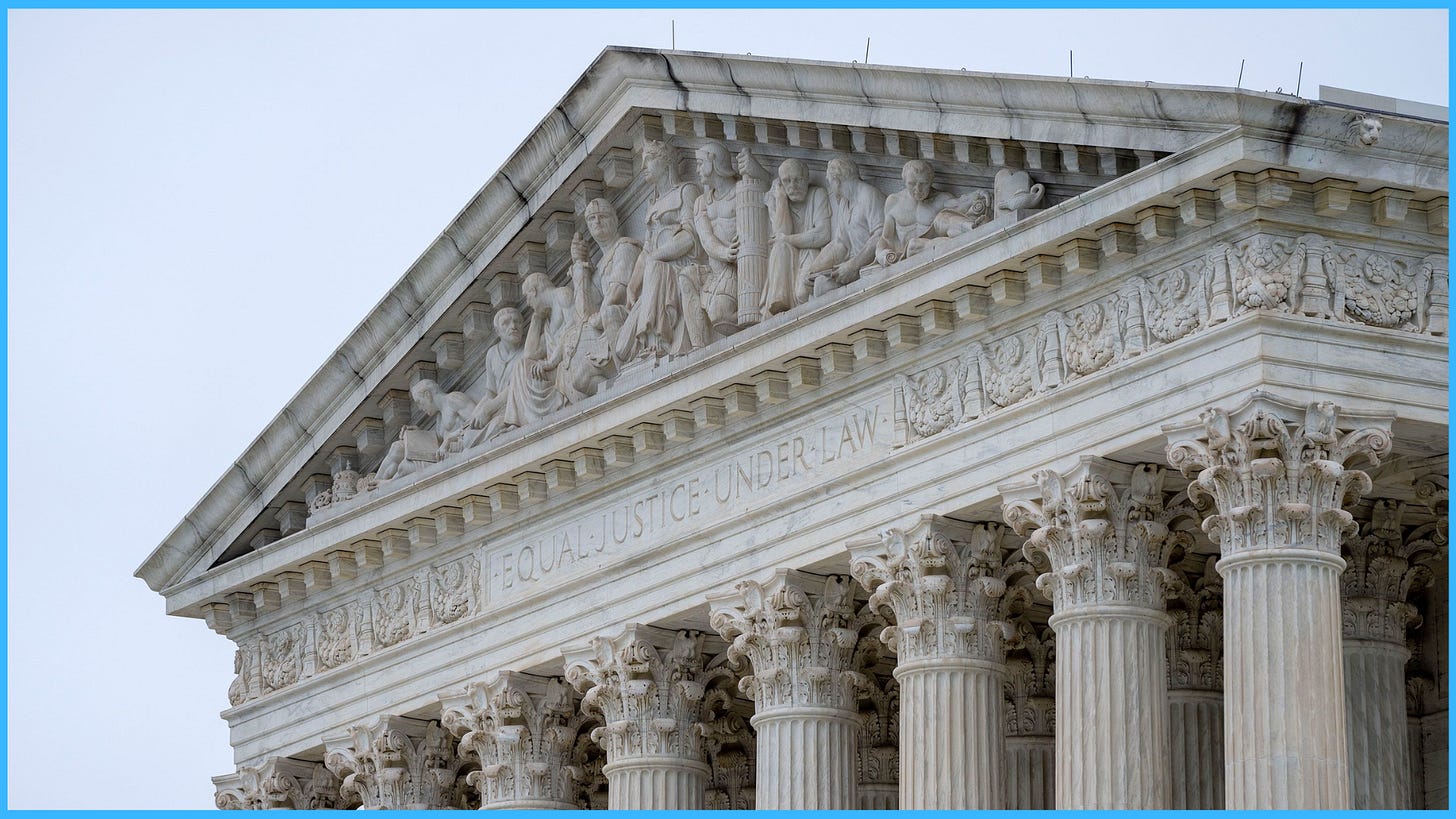


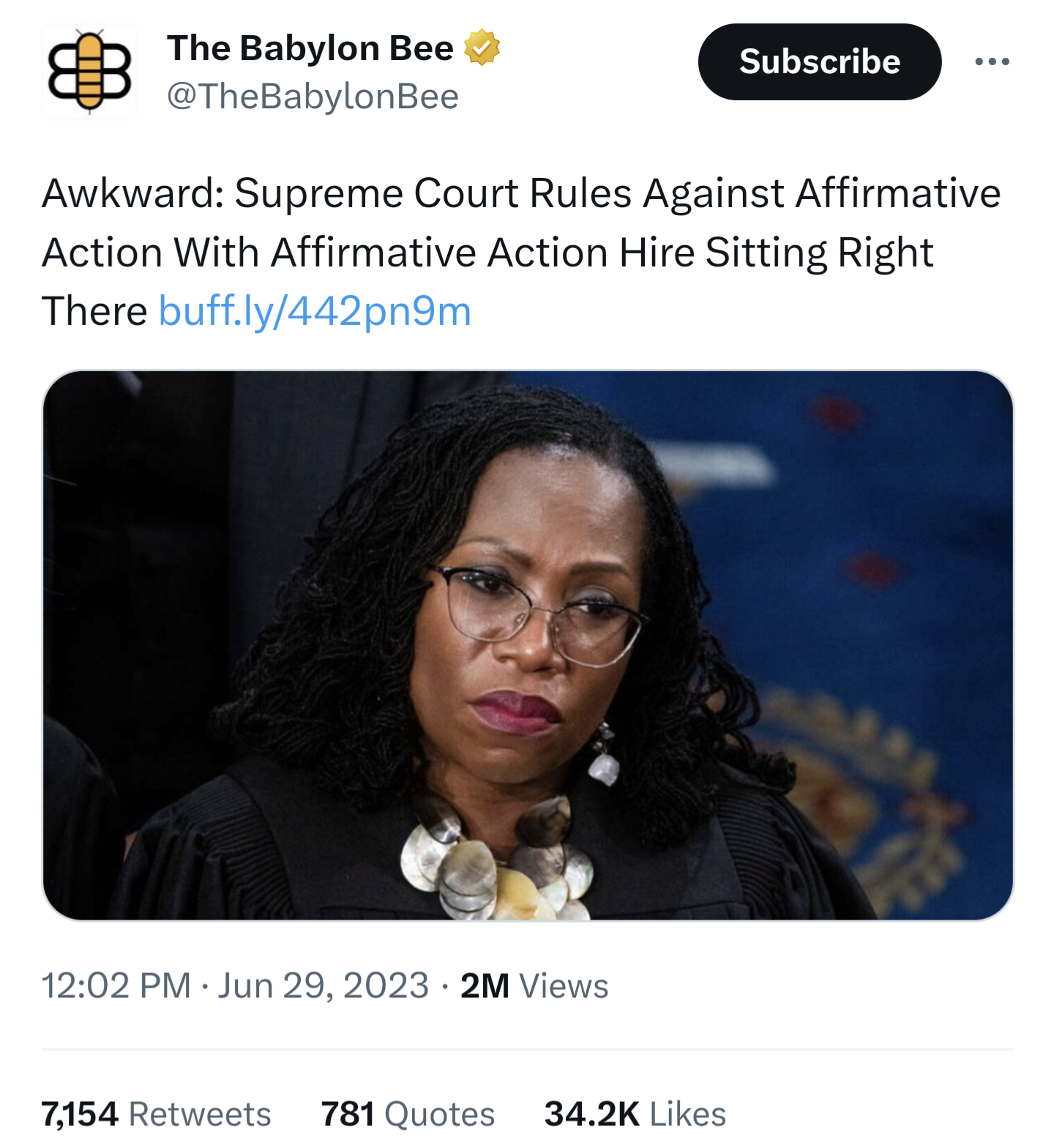
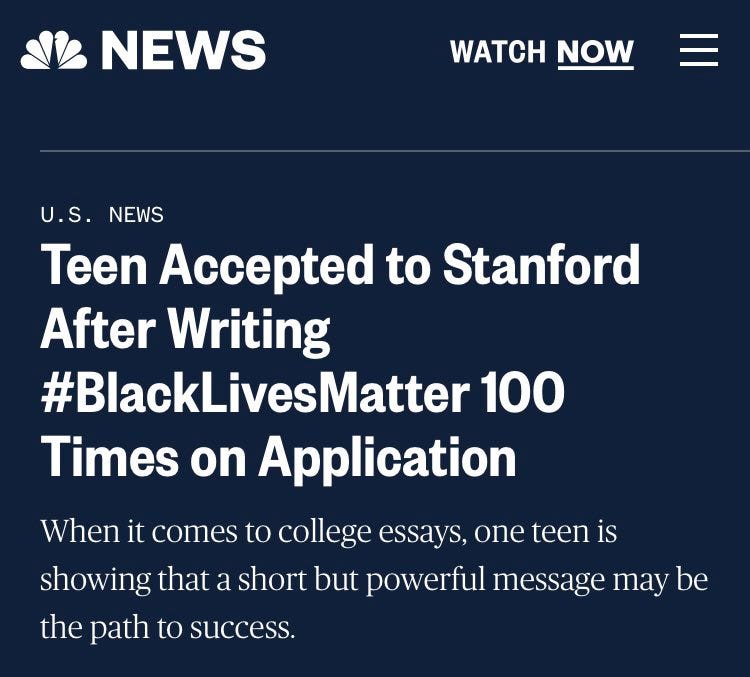


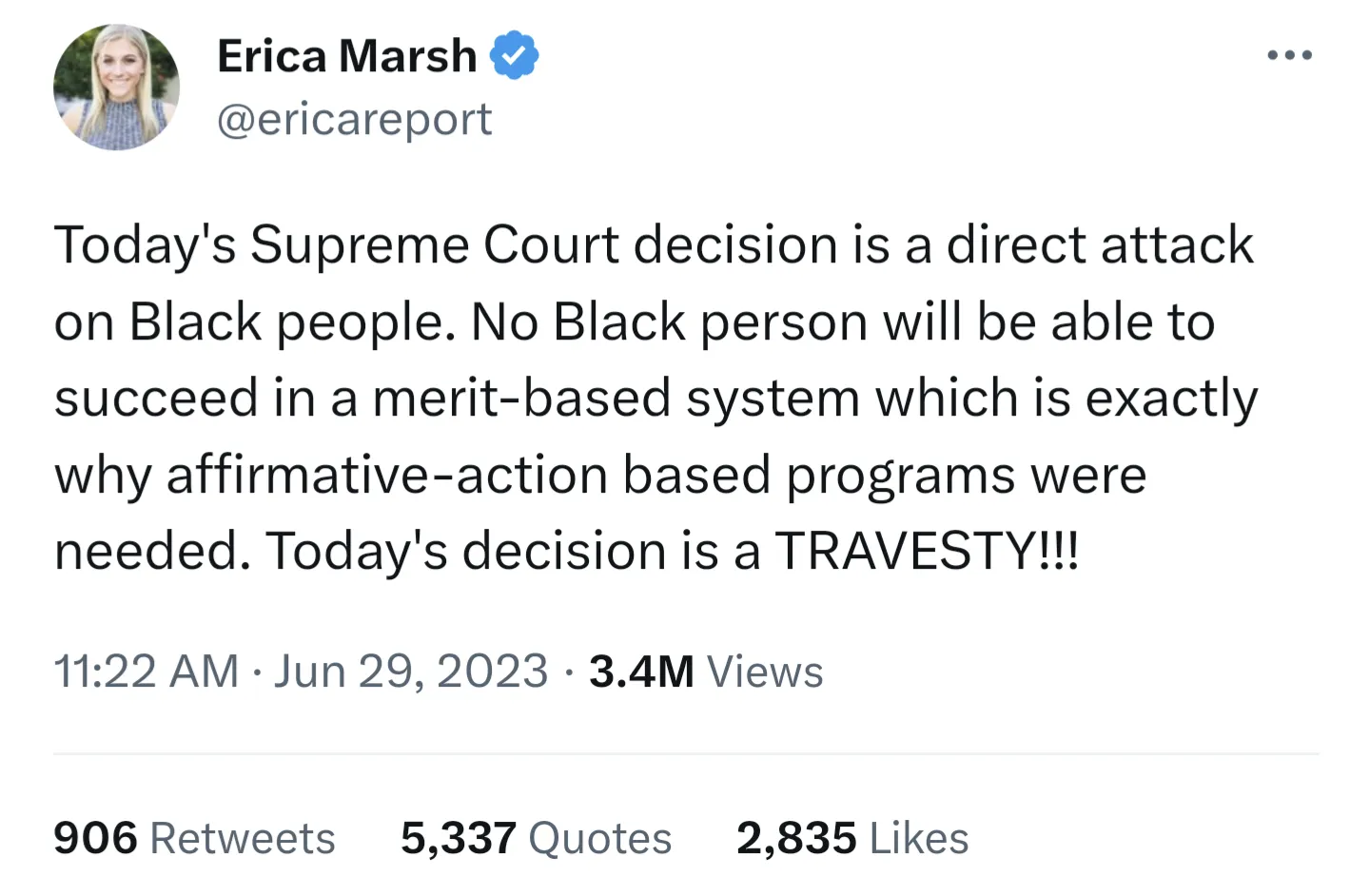

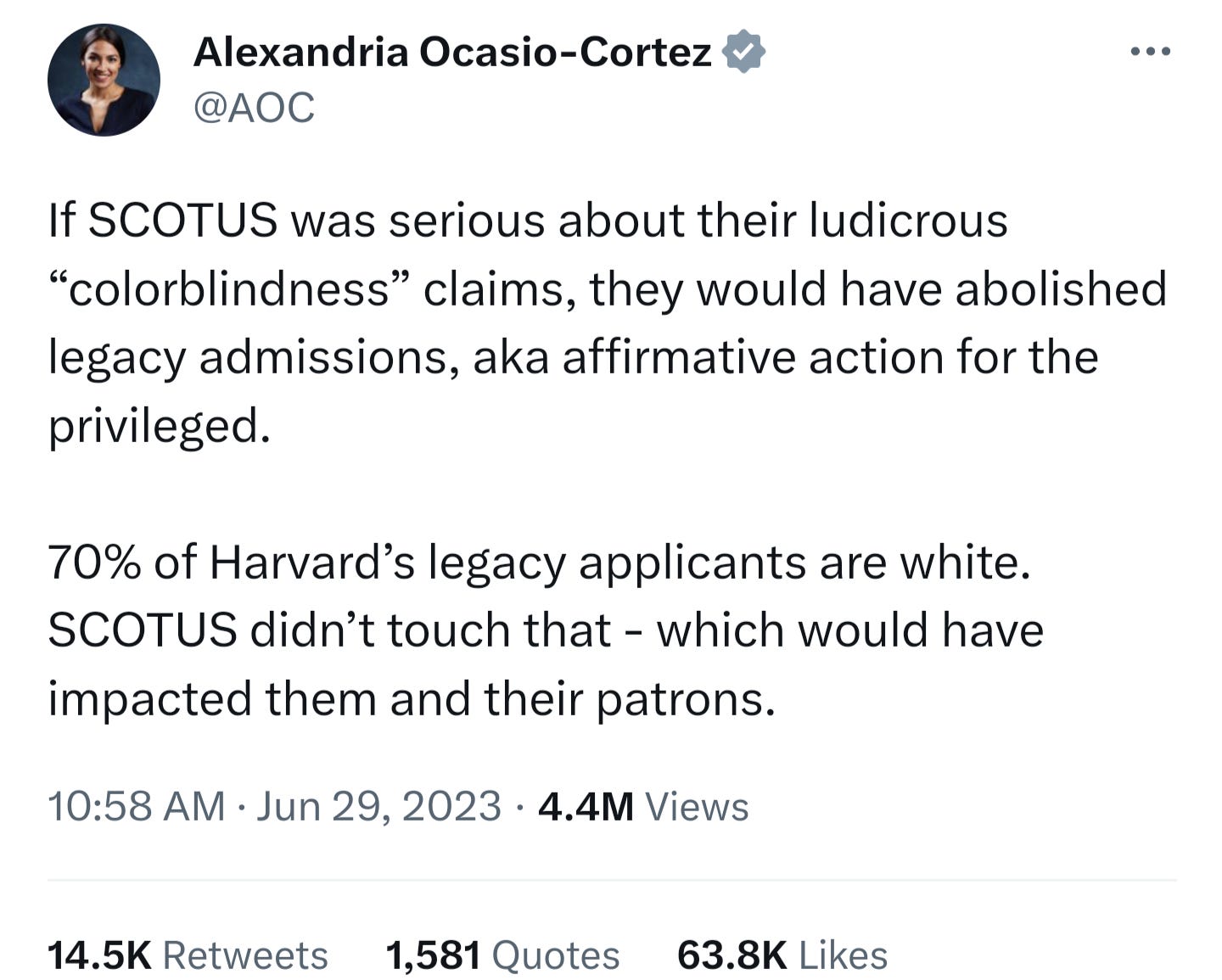






This is one of those moments where the implicit becomes explicit and the unspoken becomes spoken, which in this case shows how much White Saviorism means to liberals (which includes almost all establishment institutionalists, most esp in culture and media). White liberals cannot relinquish their sacred belief and divine crusade, what they view as their historical role and destiny: saving black Americans from their low status and somehow (no matter how much fudging is involved) transferring wealth, status and achievement to black people in the name of whatever is the sentimental abstraction du jour, Equity Equality Justice blah blah blah.
But in this case what started off decades ago as a noble enterprise has degenerated into a weird cargo cult where we're supposed to believe black people have this magical mystical essence that's been smothered by Amerikkka for centuries, that they won the space race and were British royals etc, and thus flesh-and-blood humans become sacred symbols. And once anything becomes a symbol it also becomes a weapon, a business, or in this case a moral litmus test, drenched in emotional blackmail, where how you "feel" about black people and AA decides if you're Good or Evil.
And thus we're led to the bizarre spectacle of today, where the black people who making their living toiling in the vineyards of White Guilt have to basically rage "How dare you take away our special status? How else are we to achieve and excel without white liberals tilting the playing field for us?" How degrading!
This may actually be a great day for black Americans and the sooner they can escape from their weird S&M relationship with white liberals (i.e. If you don't vote Democrat "then you ain't black") the better it will be for them.
"No Black person will be able to succeed in a merit-based system" - that's a stunning display of racism but I also think it's saying the quiet part out loud. These people consider themselves superior.